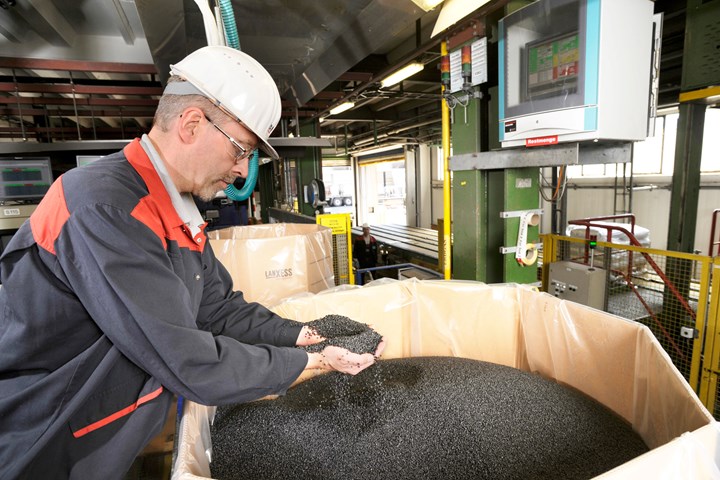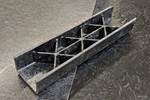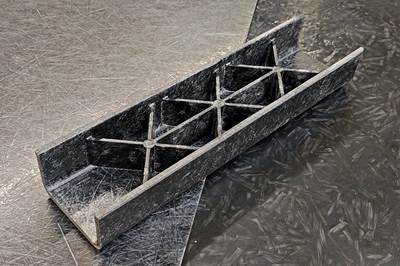Lanxess, Advent International establish global JV for high-performance engineering polymers
Lanxess and Advent acquire Royal DSM’s Engineering Materials business, and Lanxess transfers its High Performance Materials business into the joint venture, seeking a focus in automotive, electromobility and electronics.

Photo Credit: Lanxess
Lanxess (Cologne, Germany) and Advent International (Boston, Mass., U.S.), a global private equity investor, are establishing a joint venture (JV) for high-performance engineering polymers. The two companies signed an agreement to acquire the DSM Engineering Materials business (DEM) from Dutch group Royal DSM (Heerlen, Netherlands), which will become part of the new JV. The purchase price is around €3.7 billion and will be financed by the JV via equity from Advent and external debt. The business represents sales of around EUR €1.5 billion with an EBITDA margin of approximately 20%. DEM is global suppliers in high-performance specialty materials that address key market needs in electronics, electrical and consumer goods.
In addition, Lanxess says it will contribute its High Performance Materials (HPM) business unit, primarily serving the automotive industry, to the JV. According to the company, the business represents annual sales of around €1.5 billion with EBITDA pre exceptionals of around €210 million. Advent will hold at least 60% in the JV. Lanxess will receive an initial payment of at least €1.1 billion and a stake of up to 40% in the future JV. Following the transfer, the HPM business will no longer be fully consolidated at Lanxess, but will be included in the consolidated financial statements at equity.
DSM’s Engineering Materials business comprises polyamides as well as various specialty materials. Lanxess’ HPM business unit produces PA6 and PBT engineering polymers and thermoplastic fiber composites.
This move further sharpens Lanxess’ business portfolio, which will consist of three specialty chemicals segments once the transaction is completed. Lanxess notes that it will use the proceeds of the transaction to reduce debt and to strengthen its balance sheet. In addition, the group plans a share buy-back program with a volume of up to €300 million.
The company will also have the possibility to divest its stake in the joint venture to Advent at the same valuation earliest after three years. EBITDA could then be significantly higher than today, as Advent and Lanxess anticipate substantial synergies resulting from the combination of the two businesses. The transaction is still subject to approval by the authorities. Closing is expected in the first half of 2023.
“Lanxess will once again become significantly less dependent on economic fluctuations,” Lanxess CEO, Matthias Zachert, notes. “In addition, we as Lanxess will strengthen our balance sheet with the proceeds from the transaction and gain new scope for the further development of our group. With the new joint venture, we are forging a strong global player in the field of high-performance polymers. With its innovative products, the joint venture will be able to play a key role in shaping future developments — for example, in the field of electromobility. In Advent, we have a strong and reliable partner with profound experience in the chemical industry and our customer industries.”
DSM’s Engineering Materials business comprises polyamides (PA6, PA66) as well as various specialty materials (PA46, PA410 and specialty polyesters as well as PPS). Around 2,100 employees work for the division at eight production and seven research sites in all relevant markets worldwide. In addition to Europe and the U.S., the business is said to have a particularly strong presence in Asia.
Lanxess’ HPM business unit produces PA6 and PBT engineering polymers and thermoplastic fiber composites. A total of 1,900 employees at 10 production and seven research sites worldwide work for HPM. The global production network is characterized by a high degree of backward integration. The backbone is the Antwerp/Belgium site. There, HPM produces not only PA6 polymers but also relevant precursors such as caprolactam and glass fibers.
Both DEM and HPM are said to be pioneers in sustainability, offering bio- and recycled-based alternatives across their product portfolios.
Read Next
Lanxess expands Tepex flowcore composite range
Focusing on lightweight components for cars, sports equipment and consumer goods, the long fiber-reinforced thermoplastic enhances ductility, recylability and processability.
Read MoreDeveloping bonded composite repair for ships, offshore units
Bureau Veritas and industry partners issue guidelines and pave the way for certification via StrengthBond Offshore project.
Read More“Structured air” TPS safeguards composite structures
Powered by an 85% air/15% pure polyimide aerogel, Blueshift’s novel material system protects structures during transient thermal events from -200°C to beyond 2400°C for rockets, battery boxes and more.
Read More






















